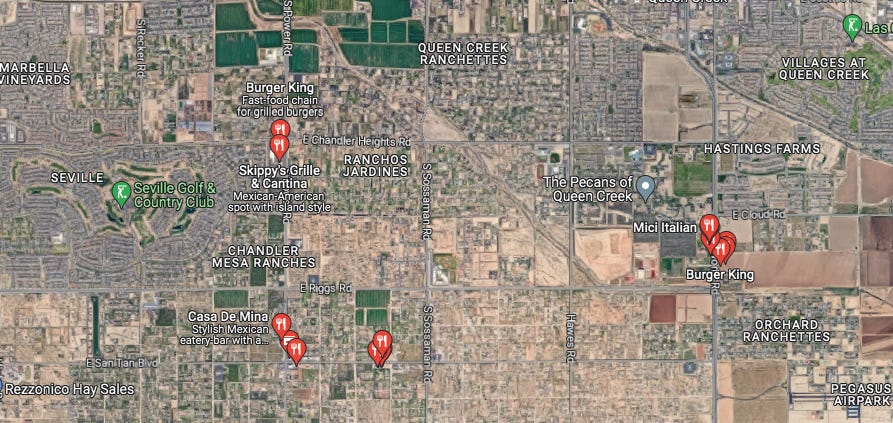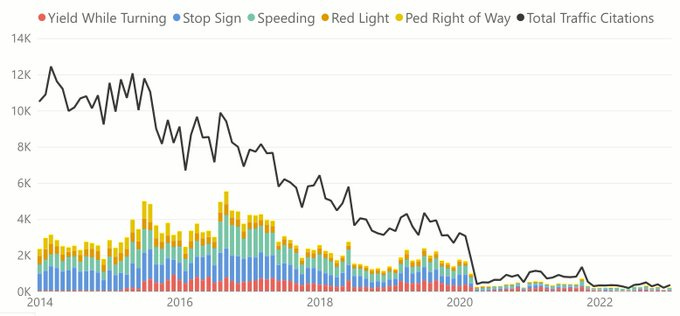Serving The Curb In America's Fastest Growing Regions
Developing standards for delivery bots, curb management comes to WA
Call for Consulting & Advisory Projects!
Those of you that know me as more than just your humble newsletter afficionado know that every year, post-Curbivore conference, I work on a few interesting mobility and delivery projects. Having scaled carsharing from zero to nationwide, launched a D2C ebike brand, worked with OEMs, and advised companies of all sizes - I’m open to compelling marketing, strategy, and growth projects of all shapes and sizes. If you’re working on something interesting this summer - let’s chat! (Update: corrected link!)
How Can You Serve Suburbia?
Last week we picked apart which parts of the country are growing fastest - largely exurbia in the Southeast and Mountain West, but with some interesting intra-regional differences. Now let’s put our thinking cap on for a minute, and strategize how both the public and private sectors can respond to these changes. In a more perfect world we’d be discussing densification and meaningful transit investments, plus larger scale reforms that discouraged further sprawl. But the facts are already on the ground, whether we like it or not; in a realpolitik kind of way, there are still opportunities to meaningfully improve things for the folks that have made these moves.
Public Sector Opportunities - Make Biking Possible
With Texas accounting for over half of the 10 fastest growing counties, let’s use the greater Dallas-Fort Worth area as a thought exercise. Given that even established, core suburbs in the region - like Arlington - lack basics like bus service, we’re going to have to set our expectations pretty low here. But if you can’t have a bus, maybe next time you’re widening the road you can carve out a few feet for a bike lane?
Let’s compare Denton, TX (where the surrounding county gained 33,424 people last year) with Irvine, CA (a still relatively fast growing part of Orange County.) Both are about 40 miles away from the their regions’ traditional core, both host large public universities, and both saw their parts of the larger region become employment centers, as new office parks covered the landscape.
Looking at these satellite views, you can see fresh subdivisions recoloring Denton’s landscape, but you don’t see a whole lot of biking infrastructure. And while Orange County is by all definitions a car-centric place, Irvine prides itself on having built 113.24 miles of off-street bikeway trails and 286.42 lane miles of on-street bikeways.
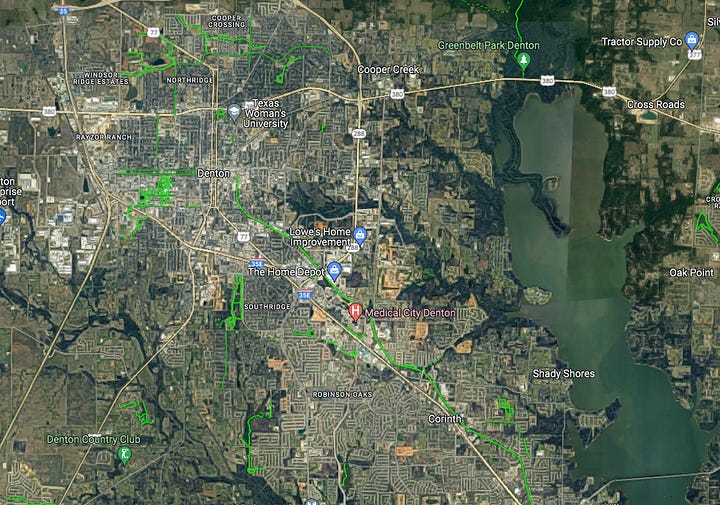
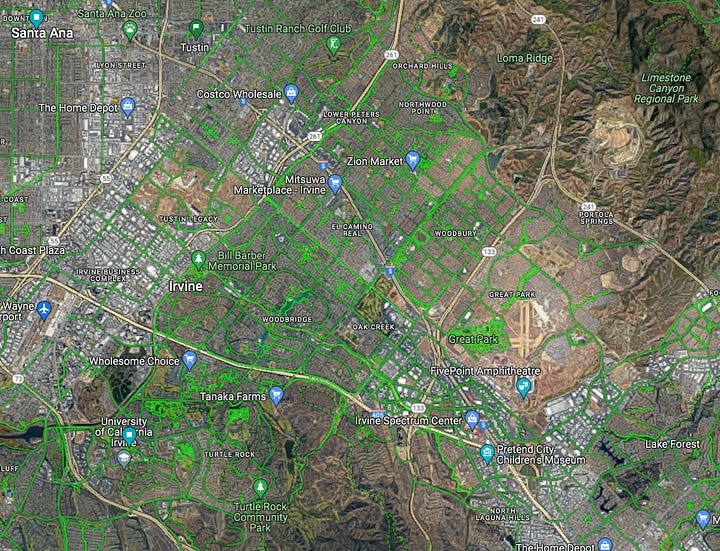
Meanwhile, almost the entirety of Denton’s biking infrastructure is one rail-trail, with no local connections to or from it. As such, its bicycle mode share is about half of OC’s. Denton proper actually has a somewhat sizable prewar street grid (the University was founded in 1890) - more so than Southern Orange County. So there’s some very low hanging fruit here in terms of adding bike lanes to relatively meaningful destinations on roads that aren’t so wide you could land a jumbo-jet on them.
If it appeals to Texans’ capitalist sensibility, adding a few bike lanes could be helpful for the private sector as well - as it might mean that for-profit micromobility services could serve the area, or local citizens might even want to buy a bike or two!
There are other relatively light-touch ways for the public sector to nudge things in a more curb-friendly direction as well. For one, they could get rid of parking minimums, and let folks decide for themselves if they need car storage. A below average ParkScore also means that expanding streateries and parklets to more parts of the city could give folks additional places to stretch their legs. Or, you know, the region could just keep building “super streets,” which sadly instead of being multimodal, actually means its “the next classification of roadway below a freeway.” 😥
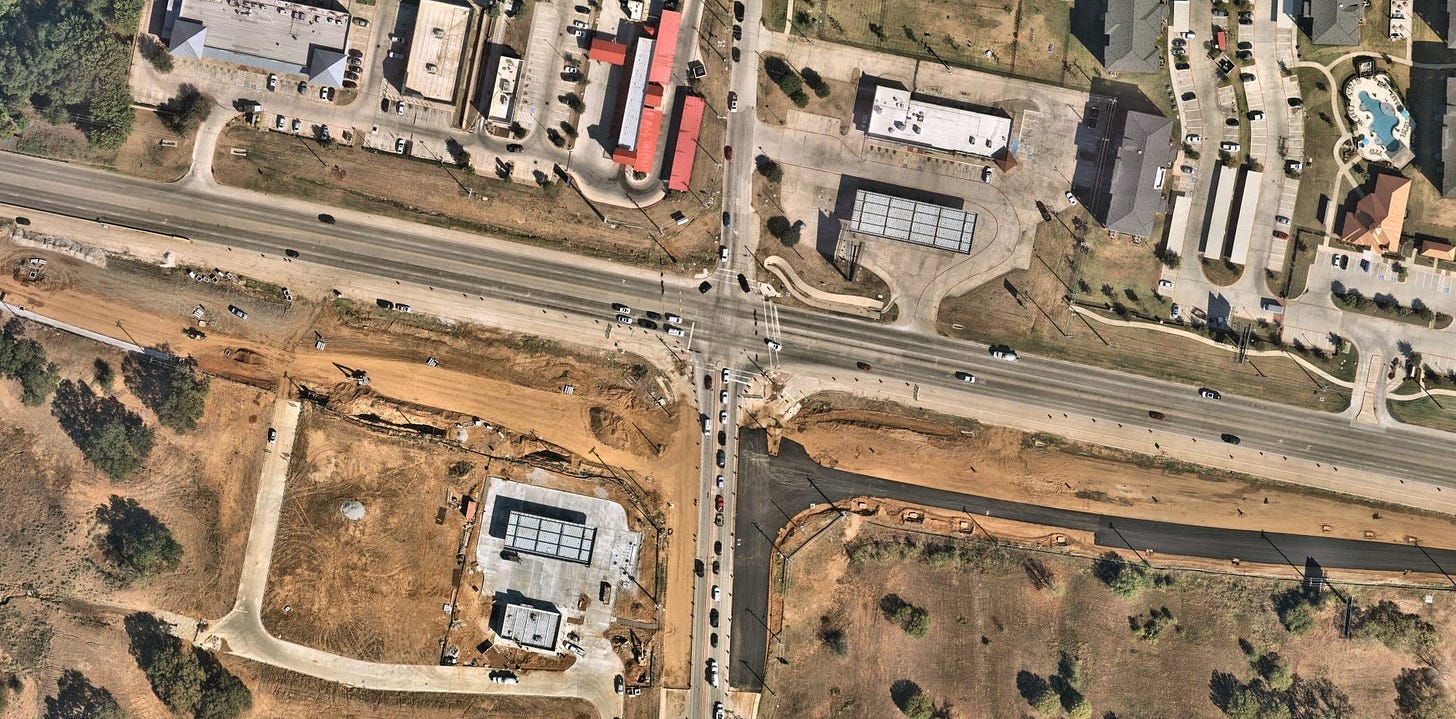
Private Sector Opportunities - A Place for Ghost Kitchens to Thrive
Residential construction tends to precede commercial development, so anywhere growing quickly tends to have a surfeit of opportunity for new businesses, provided the zoning allows for it. But sometimes a lack of commercial zoning can actually mean bigger opportunities for the right types of operators. Let’s spin the globe over to Queen Creek, an exurb of Phoenix that’s pushing 70,000 people. It’s grown about 20x since 2000, and with a new EV battery factory coming soon - don’t expect that expansion to slow.
Despite that growth, commercially zoned property is still rather scarce, as this search for “restaurants” demonstrates. (Or if you’re a bigger map nerd, play around with the city’s ArcGIS data and see how little “C” zoning there is.)
That means that if you do hold one of the city’s scant properties with a commercial kitchen, your demand is going to be high. Instead of limiting yourself to a single cuisine - this is arguably one of the situations where a ghost kitchen works best. You can see a few properties on the north side of town already adopting this approach; one outparcel at 21239 S Ellsworth Loop Road is host to a Red Robin, Donatos Pizza, MrBeast Burger, Chicken Sammy’s and Fresh Set. As we’ve seen recently some urban ghost kitchen concepts falter, I think you’re going to see better success in environments like these where consumers’ options are more limited.
There are some other creative uses of real estate to examine as well, as entrepreneurs look to keep things local in the face of changing WFH norms. Two different local coworking brands mean you never have to leave the strip mall, and if you do - EV chargers are starting to pop up as well. Baby steps!
HOT INDUSTRY NEWS & GOSSIP
Serving up standards: As the delivery bot industry matures, incumbent manufacturers and municipalities alike are going to start demanding specifications and standards. I chatted with the Urban Robotics Foundation’s Executive Director about his org’s quest to fulfill that need with ISO 4448.
Urban real estate falters: The corollary to booming exurbs full of folks working from home is weakened demand in the country’s prime CBDs. The past few days have seen some new sobering stats: Manhattan’s office vacancy hit a record high; a major Downtown LA office landlord is defaulting on its loans; The Chronicle fears SF’s financial district could be “on the verge of collapse.” While converting some functionally obsolete office buildings to housing might stanch the bleeding (and help with the population losses we’ve been discussing) - even the best legislation can’t override the fact that many postwar office towers are too thick to allow for natural light in all the rooms. (Although that pesky consideration might not be enough to stop Berkshire Hathaway’s Charlie Munger.)
Reversing reverse logistics… Amazon looks to take a bite out of the rising costs of its reverse logistics, as it will now charge some users who make returns at UPS Stores. Reading between the lines, this change is likely also driven by a desire to push more foot traffic to Whole Foods and Amazon Fresh (where returns are still free, of course.)
Automate traffic enforcement! New data from yet another city shows why our roads have gotten so dangerous - PDs have abdicated traffic enforcement responsibilities. While that’s great in that it reduces opportunities for violent encounters with the police, step two is that cities and states need to get traffic cameras and LPRs up on some poles.
Curb management comes to Washington State: Bellevue, WA just released a draft of its first curb management plan, including curb typologies, a pricing framework, and best practices. It’s great to see a fast-growing city (that’s about to get a light rail line) think about this proactively. But may we suggest not skipping the simple things - like building sidewalks in neighborhoods two blocks from downtown?
Uber wants that ebike! The Equitable Commute Project, Uber, and Zoomo have teamed up to offer discounts to encourage delivery workers to trade in old ebikes for newer models that have been UL-certified.
But nobody beats the Whizz! Meanwhile, NYC-based Whizz raised $3.4 million for its ebike subscription business, targeting couriers that want to rent bikes for deliveries. The team has previous experience in the meal kit delivery and asset rental spaces.
Ghost kitchens still hauling in cash… at least in Asia. Indonesia’s Legit Group just secured $13.7M in funding, while Curefoods landed $36.6M in India. Things are less cheery in Australia, where instant delivery player MilkRun is ceasing operations, leaving hundreds to look for new employment.
Federally exempt express? FedEx is overhauling its network, as it struggles to compete with UPS’ union-powered workforce. The first step is financial engineering - as it looks to up its dividend. The second step is merging the company’s Ground and Express divisions, which may ultimately lead to deliveries being handled only by non-employee contractors. Keep an eye on your shipment times, as FedEx has struggled with large system overhauls in the past.
Un-fare! As transit agencies stare at a financial cliff in 2025, some are hoping that beefed up fare enforcement can wring a few more bucks out of patrons. Color me skeptical that this is the best way to go about reversing ridership losses…
Are you on Substack notes? Hard to say if this will be the app that replaces Twitter, but I suppose we can’t keep all our eggs in one basket. Follow me there if you feel like keeping the conversation going.
Too many links: How trucks conquered America. Why TNC Bolt zigged where others zagged. Angelenos protest for restaurants in their home kitchens. Zoning reform comes to Big Sky Country. Gig workers face peril in India. LA needs an infrastructure capital plan. NYC gets big boy bike lane. Atlanta ready to elevate streetcar. Gov’t funding alert: bring a multimodal community to your SoCal region! Algorithm pricing data sussed out at Curbivore ‘23. Domino’s wants to grease up your car’s touchscreen. Meet the first smart pizza delivery bag.
Ciao for now!
- Jonah Bliss & The Curbivore Crew



